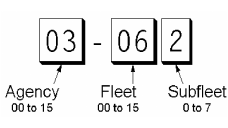
51
Special EDACS
®
Features
AFS Partial Entry Feature
AFS is Uniden's method of encoding EDACS talkgroups. AFS stands for 'Agency-Fleet-Subfleet'.
AFS talkgroups are used in all EDACS reception -- in ID SEARCH, ID LOCKOUT and ID SCAN
scanlists. The powerful AFS Partial Entry feature designed into the BC780XLT lets you use
either a complete talkgroup code, or just the most significant part.
This feature lets you expand or narrow searching and
scanning to one of 4 levels. By entering only the desired
part of an AFS talkgroup, you can select 2048 talkgroups,
128 talkgroups, 8 talkgroups, or a single talkgroup. For
example, you could program every talkgroup in a police
department with just 4 key presses. You can use the AFS
Partial Entry feature anywhere that you need to specify EDACS talkgroup.
Your BC780XLT can also enter or display EDACS talkgroups in decimal format (0-2047).
Press
MENU - TRUNK DATA, and for banks selected as EDACS banks, select Item 8,
EDACS ID FORM and change it to Decimal. You can use this feature to translate decimal
talkgroups lists to the much more powerful AFS format.
Examples of how you might use AFS are shown above in the description of an EDACS
trunked system, and elsewhere in this manual. It is very easy to use. Be sure to become
familiar with AFS Partial Entry, and your scanning will become far more flexible and efficient.
Emergency Call Alert
Your BC780XLT alerts you when an EDACS Emergency transmission occurs.
EDACS systems often provide users with an 'Emergency' button on their radios. Users in
trouble can alert the dispatcher and other units and get priority access to the radio system.
When a user activates Emergency mode your scanner will flash EMERGENCY during the
entire transmission. At the beginning of each transmission it will sound a distinctive
emergency alert tone three times.
Patch Tracking
The BC780XLT can follow EDACS patched talkgroups.
EDACS systems sometimes bring several talkgroups together in a 'Patch'. A patch might be
used by a police agency at night to provide a single channel with a single dispatcher for a
wide area. A patch is created when a single, temporary talkgroup substitutes for the original
talkgroups. While the patch is running, which may be for hours or days, the original
talkgroups cease to be used. If you were monitoring one of these talkgroups, you might think
there was no traffic, but in fact the talkgroup was operating at the different temporary number.
If a talkgroup in your Scan List is patched, your scanner will continue to receive it under its
new identity until the patch is ended. When a patch is being received, the radio will display
[PATCH ID], and will show the temporary common talkgroup plus all the included talkgroups
in a cycling display. The BC780XLT is limited to following one patch.
The temporary talkgroups used for patches are usually found in AFS code 15-xxx, and
sometimes 00-xxx.


















